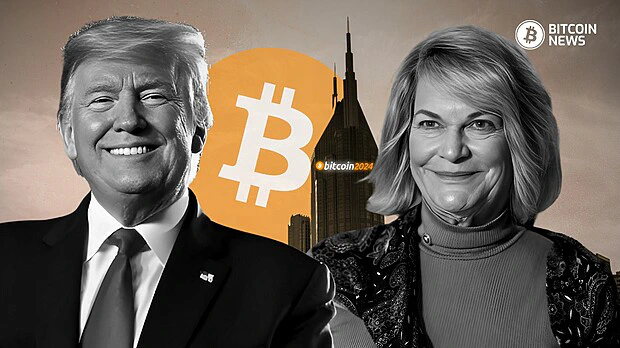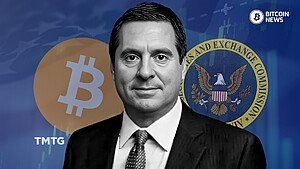In an unprecedented move that could reshape the financial landscape, Wyoming Senator Cynthia Lummis plans to introduce a groundbreaking bill at the Bitcoin 2024 Conference in Nashville.
The legislation, called the Bitcoin Reserve Bill, aims to require the Federal Reserve to hold bitcoin as a strategic reserve asset, similar to how it holds gold and foreign currencies.
This proposal has generated significant buzz in both political and digital asset circles, promising to be a pivotal moment for Bitcoin and the broader digital asset market.
Senator Lummis, a known advocate for Bitcoin, has been working on this bill discreetly for some time. The legislation, if passed, would direct the Federal Reserve to purchase and hold bitcoin, treating it as a strategic asset that could potentially stabilize the US dollar.
The idea is that Bitcoin, much like gold, could serve as a hedge against economic instability and strengthen the US monetary system.
Lummis has been hinting at a major announcement on her X account this week, stating, “₿ig things are in store this week. Stay tuned!” Interestingly, the letter B in “big” is styled as Bitcoin’s icon, featuring a B with two vertical lines through it.

This move has been generally well-received by the community.
Alex Chizhik, chief commercial officer at HarrisX, noted these developments and stated:
“Having the Fed hold Bitcoin as a strategic reserve asset would be a momentous move that brings stability to the US dollar and our capital markets. It also sends a loud signal that our central bank is embracing innovation […].”
Sam Lyman, the director of public policy at Riot Platforms, a Bitcoin mining company, stated, “Classifying the world’s largest cryptocurrency as a strategic reserve asset would be the firing gun in the ‘Bitcoin Space Race’.”
He highlighted that if the United States, being the wealthiest country and the center of global finance, started adding bitcoin to its financial reserves, it would strongly motivate other countries to follow suit.
Lyman added:
“This would send the nation-state game theory into hyperdrive as sovereigns scramble to accumulate the scarcest monetary asset on planet Earth,”
On the other hand, Steve Moore, an economist and former advisor to Trump, did not particularly agree with this initiative. He provided a statement in this regard to FOX Business.
Moore stated, “There’s no safer investment than the U.S. Treasury, so I don’t really understand why we would need to hold bitcoin as a strategic reserve, I guess a positive is that it would be a good way for the government to diversify its assets.”
Unlike his former advisor, Trump mentioned clear reasons for adopting Bitcoin in a Bloomberg interview last week.
He stated that he had recently begun to embrace digital assets, “If we don’t do it, China is going to pick it up, I don’t want to be responsible for allowing another country to take over this sphere.”
The Bitcoin 2024 Conference in Nashville, scheduled from July 25 to 27, is set to be a major event.
It will feature a host of significant speakers, including former President Donald Trump, who is expected to address the conference. Senator Lummis plans to unveil her bill on the final day of the conference, just before Trump’s speech.
According to sources, Lummis has been in contact with her colleagues on the Senate Banking Committee to garner support for the bill. Her team hopes that an endorsement from Trump could significantly bolster the bill’s chances of passing.
The Bitcoin community has been abuzz with anticipation. Social media platforms are filled with discussions about the potential impact of Lummis’s bill. Many see this as a bullish event that could propel Bitcoin into mainstream finance.
Integrating Bitcoin into the US financial system would not only hugely legitimize it as an asset but also potentially drive up its value.
Larry Fink, CEO of BlackRock, has also shown support for the concept, having recently shifted his stance on Bitcoin.
Once a critic, Fink now describes Bitcoin as “digital gold” and a “long-term store of value.” BlackRock’s recent Bitcoin ETF launch has already attracted nearly $19.5 billion in investor funds, signaling growing interest from traditional finance sectors.
The introduction of this bill comes at a politically charged time. Both major parties are keen on courting bitcoin-owning voters in what promises to be a tightly contested presidential election.
Former Democratic Representative Tulsi Gabbard, now a supporter of Trump’s presidential bid, is expected to moderate a fireside chat with Lummis during the conference, adding another layer of intrigue.
Despite the excitement, there are significant hurdles.
Critics of the bill argue that bitcoin’s volatility makes it unsuitable as a reserve asset. They worry that integrating bitcoin into the Federal Reserve’s holdings could destabilize the value of gold, which has long been a cornerstone of the US economy.
Currently, the US government holds approximately 210,000 bitcoin, valued at over $66,000 each, primarily obtained through Department of Justice seizures from illegal activities. Lummis’s bill would formalize and expand this position, potentially signaling a major shift in US financial policy.
Since the introduction of fiat currencies, central banks worldwide have held gold reserves as a guarantee to currency holders and traders.
The US currently holds the largest gold reserve, amounting to 8,133.5 metric tons. Integrating bitcoin into this mix could modernize the US monetary policy and potentially lead other nations to consider similar moves.
However, the implementation of this bill requires broad consensus from both Congress and the President. Given the current administration’s cautious approach to digital assets, achieving this consensus might be challenging.
But if Trump is elected as the next US President, this integration might become easier.
Senator Lummis has been a vocal supporter of Bitcoin for years. Earlier this year, she, along with Senator Kirsten Gillibrand, introduced the “Lummis-Gillibrand Payment Stablecoin Act” aimed at creating a regulatory framework for stablecoins.
This bipartisan bill was seen as a precursor to the current bitcoin reserve legislation, aiming to promote bitcoin-related businesses while protecting consumer interests.
Despite hopes, the path to passing the Bitcoin Reserve Bill is fraught with challenges.
Support from key political figures, including former President Trump, could be crucial. Trump’s potential endorsement could lend significant weight to Lummis’s proposal, making it more palatable to a broader range of lawmakers.










